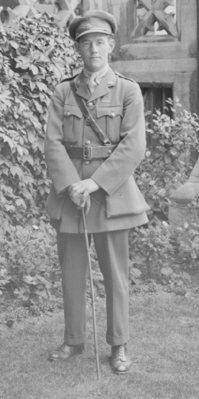Collingwood Notables Database
William Ruthven
1893-1970
Soldier, VC recipient, councillor, Mayor, Member of Parliament
William Ruthven was a Collingwood boy who became known nationally when awarded the Victoria Cross, the highest honour for bravery during wartime, for his action in France in 1918 during World War I. In later years he spent time as a local leader as Mayor and Councillor of the City of Collingwood and then as a state Labor parliamentarian. A park, a secondary college and a railway station are named in his honour in the northern suburb of Reservoir.
William Ruthven was born in Collingwood as was his father Peter. His grandfather, John Ruthven was a carpenter living in Campbell Street Collingwood from the 1860s onwards. During William’s childhood his parents lived nearby in Vere Street and in Francis Street Collingwood. His father, Peter, was also a carpenter. Ruthven attended the Vere Street State School.
When he enlisted as a private in the army in April 1915 he had been working as a wood machinist in the timber industry. He joined the 22nd Battalion and went first to Gallipoli and then to France. He was awarded the Victoria Cross for his actions in France in May 1918 and was promoted to Lieutenant.
With several other V.C. winners, he was asked to return home to help with recruitment. Arriving in October, he was given a hero’s welcome at a special event at Victoria Park, with his parents in proud attendance. In later years his widow remembered his 1918 homecoming: ‘They wanted him to come home and he didn’t want to come home. And they said, “Wouldn’t he want to see his fiancée and his mother”, and he said “Yes”. They said he’d be able to come back again. He was only home one day and the war ended and he was very sad about that. He wanted to be there at the finish you see.’
On his return to Australia, Ruthven resumed work as a wood machinist and in 1919 he married Irene May White at St Philip’s Church Abbotsford. Irene had grown up in The Esplanade, Clifton Hill. In the mid 1920s he and his family moved to a soldier settlement block at Werrimull in far north west Victoria.
As was the case with many of these ventures, Ruthven's soldier settlement experience proved unsuccessful and in 1931 they returned to Collingwood. He worked as a carrier and they lived in The Esplanade with Irene’s parents. He served as a Major in the Army Reserve in World War II.
Ruthven was active in the Returned Servicemen’s League in Collingwood and laid the memorial stone at the RSL Hall in Hoddle Street as well as performing the opening ceremony in conjunction with Captain Jacka, VC. He was also official timekeeper for the Collingwood Football Club and a founding member of its social club.
Ruthven was elected to Collingwood Council in 1931 and again in 1940; in 1945-46 he was the Mayor. By the late 1940s he had moved north to Preston to live. He was elected the member for Preston in the Victorian Legislative Assembly in 1945 and remained in parliament as member for Preston and, after a redistribution, for Reservoir until he retired in 1961.
Life Summary
| Birth Date | Birth Place |
|---|---|
| 21 May 1893 | Collingwood |
| Spouse Name | Date of Marriage | Children |
|---|---|---|
| Irene May white | 1919, St Philip's | One daughter, one son |
| Home Street | Home City | Status of Building |
|---|---|---|
| 97 Vere Street (late 1890s, early 1900s) | Collingwood | Demolished |
| 48 Francis Street (1910s) | Collingwood | Demolished |
| 22 The Esplanade (1920s, 1930s) | Clifton Hill | Extant |
| Church | Lodge |
|---|---|
| St Philip's Anglican, Abbotsford |
| Death Date | Death Place | Cemetery |
|---|---|---|
| 12 January 1970 | Heidelberg | Cremated |
In those days: Collingwood remembered; Victoria’s World War 1 Legacy: recipients of the Victoria Cross, Victorian Government; Table Talk; The Age; The Argus
ADB Ruthven
Victoria's WW1 Legacy: Recipients of the Victoria Cross

